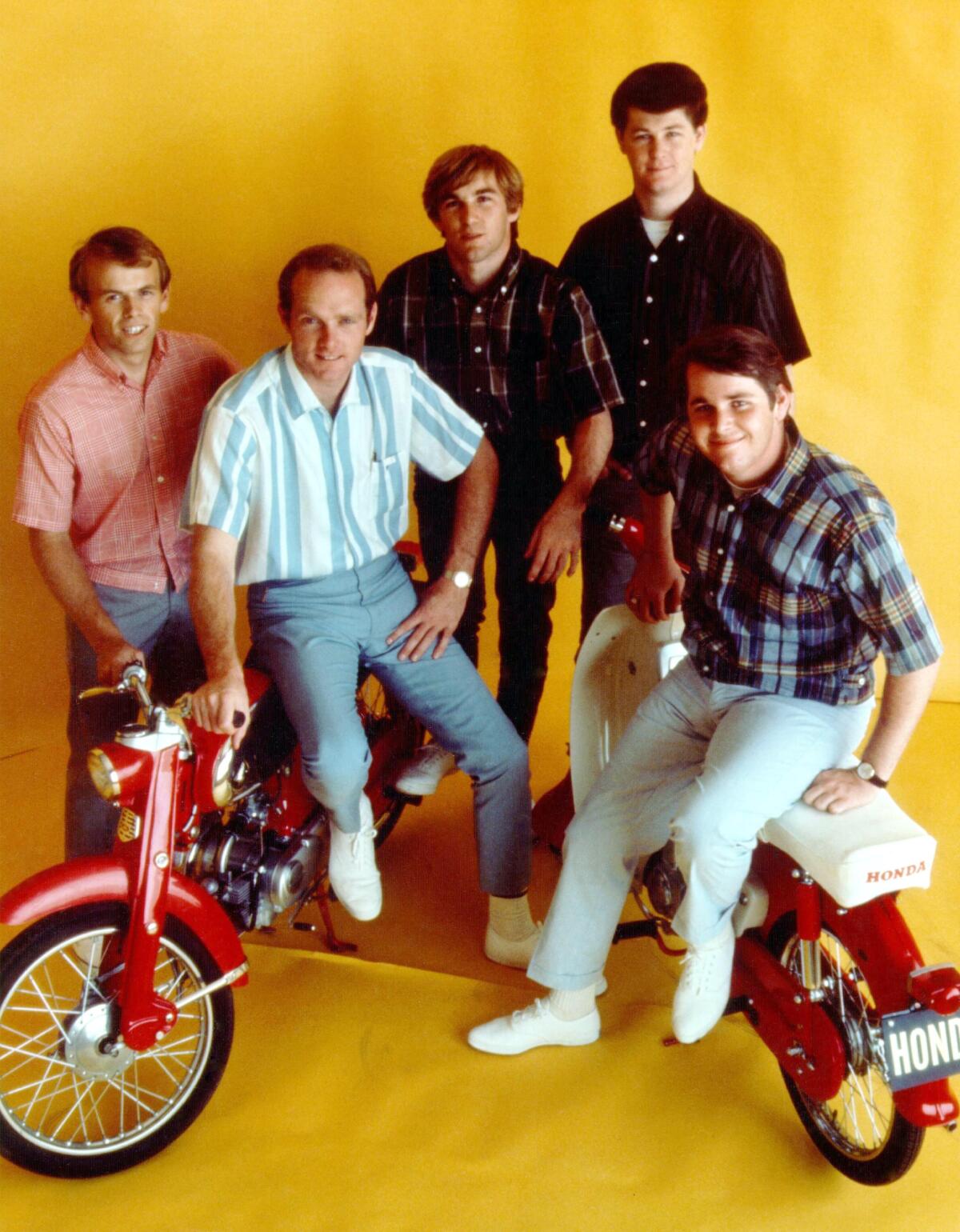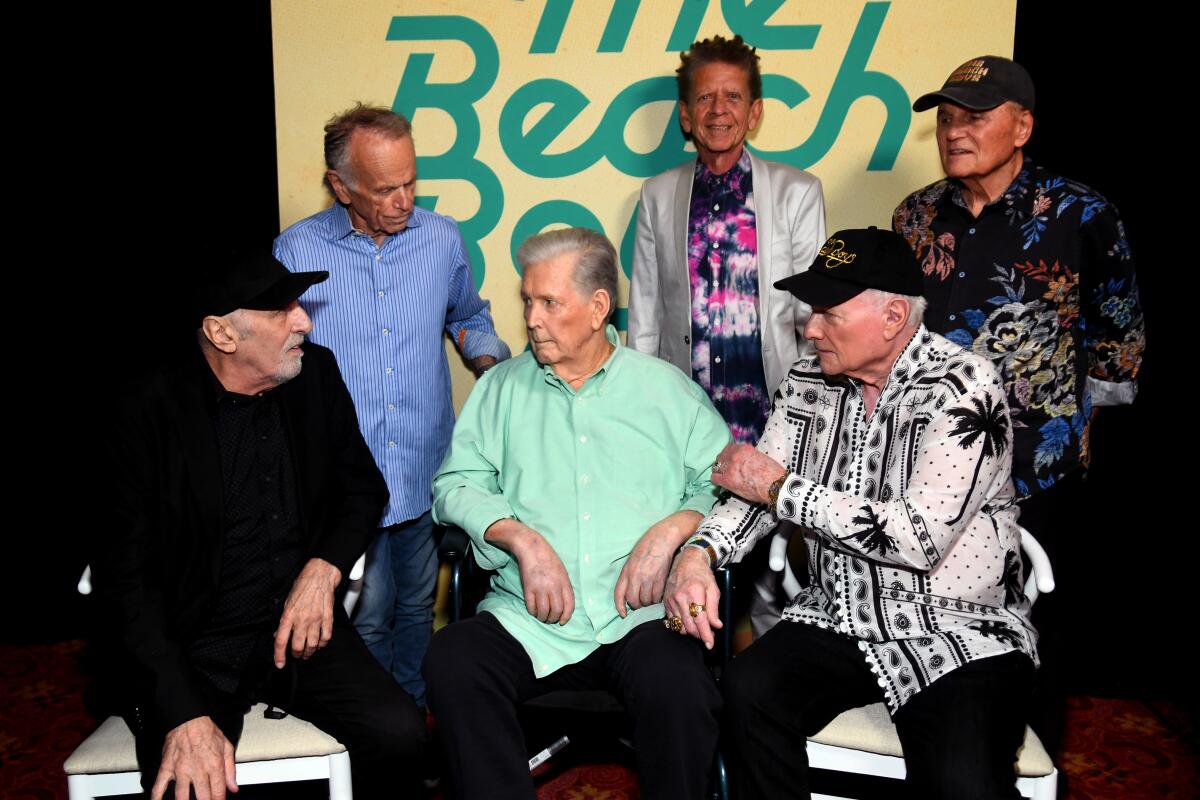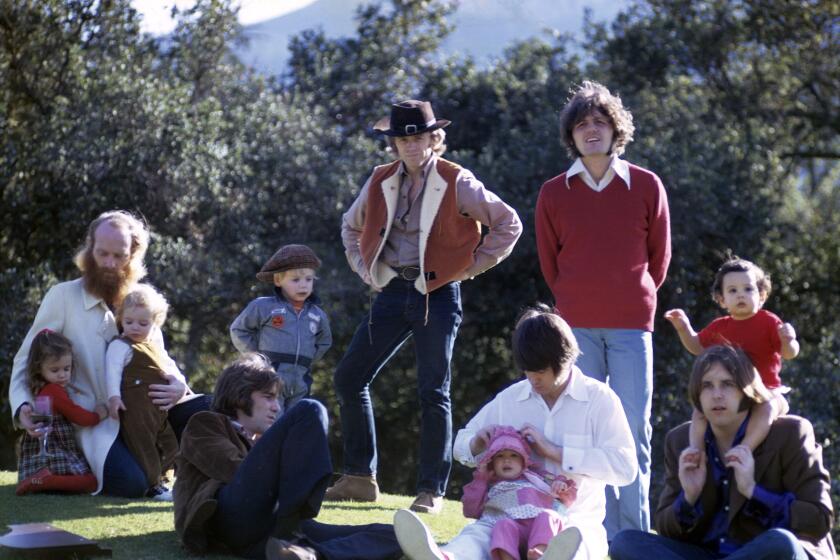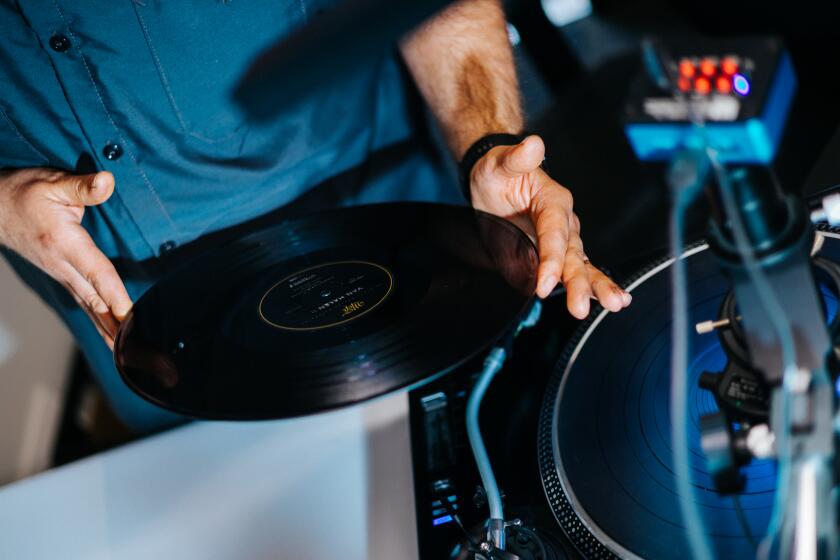The Beach Boys on Lana Del Rey, Charles Manson and their wistful new Disney+ doc

- Share via
Mike Love is sitting in a blah-looking room in a Sheraton hotel in North Carolina, the garish pattern of his signature Hawaiian shirt popping against the ochre wallpaper behind him.
The 83-year-old Beach Boys frontman came to Charlotte the other day to play the Lovin’ Life music festival alongside Post Malone and DaBaby, and 36 hours later he’s still in the mood to brag: “We had several thousands of people singing along to our songs,” he says in a Zoom call. “A lot of teenagers and stuff dancing around. Pretty phenomenal considering we’ve been doing this a little over 60 years.”
As fans of the Beach Boys know, “we” requires a bit of unpacking.

Six decades after Love formed the band in suburban Hawthorne with his cousins Brian, Dennis and Carl Wilson and their friend Al Jardine, a Beach Boys concert these days means a performance by Love and Bruce Johnston, who took over onstage for Brian Wilson after Brian quit touring in 1965, and a number of very capable backing musicians. (Jardine refers to this outfit as “Mike’s band.”) Brian, the acknowledged mastermind of one of America’s most transformative rock acts, eventually returned to the road and toured regularly under his own name with Jardine and other players until 2022, when health troubles forced him offstage again.
So: two sets of Beach Boys, driven apart by fights over money and creative control, neither containing any of the blood relatives whose crystalline harmonies lifted the group’s music to a kind of celestial state.
Yet Love has old family ties on his mind as he discusses “The Beach Boys,” a sunny if slightly wistful new documentary co-directed by Frank Marshall and Thom Zimny that premiered Friday on Disney+. The Beach Boys’ story has been told countless times in other films and shows and books and podcasts — “too many times,” Johnston, 81, notes with a laugh in a separate call. But this was an “opportunity to show that this is a family situation,” Love says. “A family band.”
Premiering Friday on Disney+, ‘The Beach Boys’ is a compact telling of the band’s history with a wealth of archival photographs and home movies, many new.
Love, who co-wrote many of the Beach Boys’ biggest hits with Brian, recalls learning to sing half a century ago “at birthday parties and Thanksgiving and Christmas parties and New Year’s Eve”; he remembers blending his voice with Brian’s in the car on Wednesday nights as they drove home from Angeles Mesa Presbyterian Church in Windsor Hills. “When we had my Dorsey High School senior trip, I invited Brian to go with me,” he tells The Times. “I didn’t invite a girl. I was a little shy and awkward and everything. But nice cousin Brian — we went to Catalina and back.”
In the movie, Love’s blue-gray eyes well up as he describes his bond with Brian, whose mental health struggles could make it difficult to communicate with other people even as his music was expanding the scope of pop in the mid-1960s.
“There was so much love and so much rapport between us at that time that it showed up on the records,” Love says from Charlotte. “They talk about Elton John and Bernie Taupin. Well, it was Mike Love and Brian Wilson — Brian Wilson and Mike Love, whatever.”
With a blend of archival footage and interviews with the band’s surviving members — Dennis Wilson died in 1983, Carl in 1998 — the new documentary comes at a moment of high visibility for the Beach Boys, who three years ago drafted Irving Azoff’s Iconic Artists Group to “preserve and grow their legacy in a digital era,” as a statement put it.

Beyoncé interpolates a bit of “Good Vibrations” on her hit “Cowboy Carter” album, while Lana Del Rey turned up with the band at last month’s Stagecoach country music festival in Indio. “My daughter Ambha, who’s 28, she’s been a fan of that person since she was Lizzy Grant,” Love says, referring to Del Rey’s former stage name. “She even told Lana, ‘Hey, I’ve been playing my dad your music since I was 12.’ Lana got a kick out of that.”
Just this week, the Beach Boys’ “Pet Sounds” — the classic 1966 LP that set a new benchmark for expressive pop sophistication — landed at No. 20 on Apple Music’s much-discussed ranking of the 100 best albums of all time.
Says Zimny, known for his earlier docs about Elvis Presley and Bruce Springsteen: “They created a sound that’s still active in our dreams today.”
Less happily, the Beach Boys have been in headlines this month as a result of Brian’s being placed under a conservatorship following the recent death of his wife, Melinda Wilson, who’d been responsible for his care amid a diagnosis of dementia. Brian made a rare public appearance Tuesday night at the movie’s premiere at Hollywood’s TLC Chinese Theater, where he posed for photos with the band for the first time since a 2023 Recording Academy tribute to the Beach Boys.
Yet light and dark have always been intertwined for a famously clean-cut group whose story encompasses substance abuse, mental illness and a bullying father-slash-manager. “The Beach Boys” glides pretty smoothly over much of the rough stuff, though it doesn’t try to steer around Dennis’ ill-advised friendship with Charles Manson not long before the Tate-LaBianca murders.
A new Beach Boys box set with expanded versions of two overlooked 1970s albums, ‘Surf’s Up’ and ‘Sunflower,’ makes a strong case for their post-peak greatness.
“I only met the guy once and that was enough for me, but Dennis had him as his roommate,” Love says today. “The whole thing was terrible. But it happened. It was the reality. It was the ’60s — there were drugs, there was insanity, there was the Vietnam War going on. It was heavy-duty. But you know what? I always like to accentuate the positive. So it’s good vibrations.”
One way of thinking about the power of the Beach Boys’ music is to hear the essential sadness in even the most joyful of their songs. Love’s not so sure about that: “If you’re talking about ‘Fun, Fun, Fun’ or ‘I Get Around’ or ‘Surfin’ U.S.A.,’ there ain’t no melancholy in them,” he says. “Even in ‘The Warmth of the Sun,’ it’s about how you were in love but it didn’t happen — she doesn’t feel the same way anymore, so you’re left. But at least you have the memory of having felt that euphoria of being in love.”
According to Azoff, the veteran music industry insider who manages the Eagles and U2, “The Beach Boys” grew out of an offer from the cable network Epix (now known as MGM+) to make a documentary about the band. Azoff decided “we could do better than Epix” and brought in Marshall, a longtime presence in Hollywood, and together they went to Disney chief Bob Iger, who Azoff says personally made the decision to buy the doc for Disney+.
For the record:
1:53 p.m. May 27, 2024An earlier version of this story said the movie “Love & Mercy” was released in 2004. The movie came out in 2014.
“To me, their story hadn’t been told for a while other than Brian’s personal story — and nobody really wants to see Dr. Landy anymore,” Azoff says, referring to late psychologist Eugene Landy, whose controversial treatment of Brian in the ’80s was depicted in the 2014 film “Love & Mercy.”

Marshall was drawn to the group’s family dynamics in part, he says, because he grew up in a musical family: His dad was Jack Marshall, a jazz guitarist and composer who also worked as a producer at the Beach Boys’ record label, Capitol. In 2020 he directed HBO’s acclaimed “How Can You Mend a Broken Heart,” about another band of brothers, the Bee Gees.
“Both those groups had a father figure that was instrumental in their lives — in a good way for the Bee Gees and a not-so-good way for the Beach Boys,” Marshall says. The film examines Murry Wilson’s domineering role in the band’s affairs, including his battles with Brian over their work in the studio and his sale of the group’s publishing in 1969 for less than $1 million. (Billboard estimates that today the Beach Boys’ catalog would be worth more than $200 million.)
“A father should never be a manager — that was really where it all stemmed from,” Jardine, 81, says over Zoom. “He’d be all over the place with us, telling us how to tune up. His famous term was ‘Treble up, boys!’ He’d lost his hearing, apparently, and he didn’t think it was bright enough. Things like that were maddening.”
The movie also hints at the tension between Love and Dennis Wilson — “competitive cousins,” Jardine calls them — as the two vied to be seen as the Beach Boys’ resident heartthrob. “Any time Dennis could upstage Mike, he’d do it,” Jardine tells The Times. “All he had to do is stand up on his drums and hold his hands in the air with his drumsticks and the crowd went crazy. As soon as Mike was delivering a little gab, he’d time it just so that he’d get the applause instead of Mike.” He laughs. “Drove Mike nuts.”
With pop acts like Taylor Swift cutting multiple editions of LPs and pricy back-catalog reissues, Fidelity pressing plant in Oxnard says it is ready to help the vinyl boom stay in the groove.
According to Jardine, Love wasn’t the only target of that energy from Dennis. He remembers the Beach Boys sharing a trailer with the Rolling Stones at a gig in Jacksonville, Fla., in the mid-’60s, “right when they first came over here. They sat at one end of the trailer and we sat at the other. We never spoke. I think Dennis had a problem with Mick [Jagger], as I recall.” He shrugs. “Alpha types.”
Beyond the band’s complicated relationships, “The Beach Boys” tracks the group’s friendly rivalry with the Beatles and highlights Brian’s pioneering role as the band’s producer in an era when few if any pop acts were overseeing their own recordings.
“In 2024 that’s a common thing, but this was a world in which writers, producers and performers were all separate,” says producer Dan Nigro. Known for his work with Olivia Rodrigo and Chappell Roan, Nigro co-wrote and produced a Beach Boys-inspired tune by singer Stephen Sanchez, “Baby Blue Bathing Suit,” that’s featured as a bonus track on the documentary’s soundtrack. “Brian was the first person I knew of that was doing it all.”
Producer Mike Elizondo, who served as music director for last year’s Recording Academy tribute, still uses the Beach Boys’ music as a source of motivation when he’s working with an artist in the studio. “Even if we’re not necessarily trying to make a Beach Boys-sounding record, it’s like, ‘Look, this is what’s possible if you’ve got a vision and you forge ahead,’” he says.
Given Brian’s condition, nobody in or around the Beach Boys says they expect a reunion like the one the group convened to mark their 50th anniversary. But Love’s band will be on tour all summer (including an Aug. 30 stop at L.A.’s Greek Theatre), and there’s a limited-edition vinyl reissue of “Pet Sounds” on the way later this year. Last month, a handsome new coffee-table book, “The Beach Boys by the Beach Boys,” was published with photos and detailed reminiscences from the members.
“There’s a lot of nostalgia involved for somebody that was in the band,” Love says of all the retrospective action — so much that it can almost seem painful.
“We were so close growing up,” he says of himself and Brian. “We’d listen to KGFJ and KDAY in his Nash Rambler after we got kicked out of the house for making too much noise because my dad had to go to work at Love Sheet Metal in the morning. We’d literally hang out in the Rambler, listening to the radio, singing things, just cracking each other up.”
More to Read
The biggest entertainment stories
Get our big stories about Hollywood, film, television, music, arts, culture and more right in your inbox as soon as they publish.
You may occasionally receive promotional content from the Los Angeles Times.













